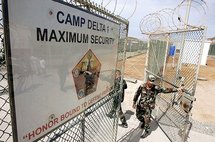Guantanamo detainee fate rests with US judges: analysts
Lucile Malandain
WASHINGTON, Lucile Malandain- A year after President Barack Obama ordered Guantanamo closed, the prison remains intact and some 50 detainees appear set to be locked up indefinitely. But civilian judges still have the final say over their detention, analysts say.
A Justice Department-led task force has recommended that the 50 prisoners be held indefinitely because they are too dangerous to release and evidence against them is insufficient for a criminal trial, the Washington Post reported Friday.

In May, Obama warned that some detainees would be held without trial, and last month the government acquired a prison in rural Illinois to accommodate them.
Since a June 2008 Supreme Court decision, 15 federal judges in Washington have had the final say on whether a Guantanamo prisoner can be determined to be "an enemy combatant."
In the absence of clearly defined guidelines, the judges themselves are the architects of law for the detainees.
Obama's move to not "seek additional legislative authority for detentions at Guantanamo Bay, Cuba -- combined with Congress's lack of interest in the task -- means that, for good or for ill, judges must write the rules governing military detention of terrorist suspects," said a Brookings Institution study.
The study on habeas corpus released Friday, written by legal experts Benjamin Wittes, Robert Chesney and Rabea Benjamin, noted there was endemic confusion among judges dealing with the prisoners.
"Some detainees freed by certain district judges would likely have had the lawfulness of their detentions affirmed had other judges -- who have articulated different standards -- heard their cases," the study found.
Each judge wrestles in his or her own way with key questions, such as whether someone can be deemed an "enemy combatant" if they were an active member of Al-Qaeda, or if they only provided material support.
"The (George W.) Bush administration gave us four definitions, the Obama administration gave us another definition," noted US District Court Chief Judge Royce Lamberth last month during a conference.
"Most of us have adopted one definition, but I have one renegade judge that's got another definition," he said.
Inconsistencies should diminish as more cases reach the top US courts on appeal, and precedents are set down, the researchers added.
What appears clear, however, is that federal judges -- whether appointed by a Democrat or Republican president -- have overwhelmingly cleared inmates of terrorism charges. In only nine of the 41 cases examined so far have prisoners remained in detention.
The Justice Department-led task force divided up the remaining Guantanamo Bay detainees into three main groups, the Washington Post said, identifying 35 who should be prosecuted in federal or military courts, at least 110 who can be either immediately or eventually released, and the 50 or so to be held without trial.
"We're still moving forward and in a much more deliberate and less haphazard manner than was the case before," an administration official pledged, according to the newspaper.
Human rights organizations and legal experts have long criticized Obama for keeping prisoners locked up indefinitely.
"One of the most shameful chapters of American history was to have been brought to a close with the shuttering of the prison at Guantanamo Bay," said Anthony Romero, executive director of the American Civil Liberties Union.
"But just as important as closing the prison quickly is closing it right and that means putting an end to the illegal policy of indefinite detention without charge or trial."
He argued in a statement that the Obama administration should not create a "Gitmo North" by transferring prisoners to US facilities "to be illegally held without due process."
"This practice was wrong in Cuba and would remain so here, reducing the closure of Guantanamo to a symbolic gesture."
--------------------------------------------------------------------------------------